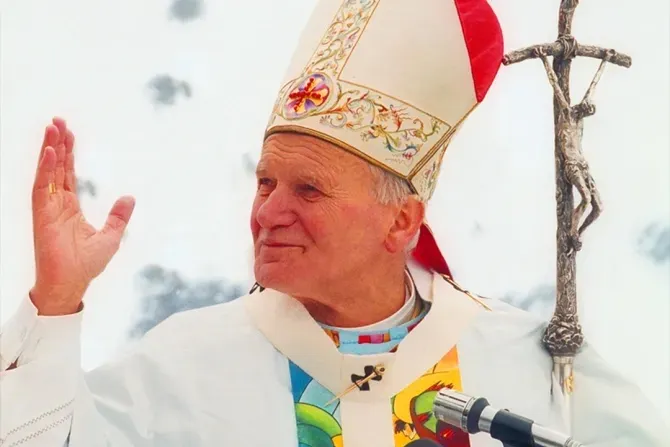
ACI Prensa Staff, Apr 11, 2024 / 06:00 am (CNA).
Nearly 40 years ago, an event was held in Rome that laid the foundations for what today is World Youth Day (WYD). On April 14, 1984, Pope John Paul II met in Rome with 300,000 young people from all over the world who were hosted by some 6,000 Roman families.
WYD is an encounter of young people from all over the world with the pope that takes place every two or three years in different cities around the world. The first one took place in Rome in 1986. Since then, the fruits of each WYD have flowed: conversions, vocations discovered, and even alleged miracles.
The seminal event was part of the 1984 Holy Year of Redemption, held near Palm Sunday. On that occasion, the pope told the assembled young people that “the real problem of life is, in fact, that of verifying, first of all, what is the place of youth in the present world.”
St. John Paul II then addressed each of those present personally, explaining that young people are called to make the love and message of Jesus Christ present in each of their own lives.
“If you know how to look at the world with the new eyes that faith gives you, then you will know how to face it with your hands outstretched in a gesture of love. You will be able to discover in it, in the midst of so much misery and injustice, unsuspected presences of goodness, fascinating perspectives of beauty, well-founded reasons for hope in a better tomorrow,” he told them.

The Holy Father stressed that that this can only be achieved through a deeply rooted faith in Jesus.
“True strength lies in Christ, the redeemer of the world! This is the central point of the whole discourse. And this is the moment to ask the crucial question: This Jesus who was young like you, who lived in an exemplary family and knew the world of men in depth, who is he for you?” the pope asked.
At that time, St. John Paul II presented the famous “Youth Cross” to the organizers of the event, with the mission of taking it throughout the world “as a sign and reminder that only in the dead and risen Jesus is there salvation and redemption.”
This wooden cross has become a symbol of WYD, traveling throughout the dioceses of the world and in all the places where the event takes place.
The cross is kept today by the San Lorenzo International Youth Center (CSL), which together with the sponsorship of the Dicastery for the Laity, Family, and Life and the John Paul II Foundation for Youth, have organized a series of events to celebrate the 40th anniversary of this first encounter of the Polish pope with young people.
On April 13, the “Youth Cross” will go on a pilgrimage from St. Peter’s Square to the CSL and a Mass will be celebrated by Cardinal José Tolentino de Mendonça. The day will conclude with a prayer vigil and adoration of the cross, known as “Rise Up.”
On Sunday, April 14, Cardinal Lazarus You Heung-sik, prefect of the Dicastery for the Clergy, will offer the Mass and later there will be a time for young people to give their testimonies.
The San Lorenzo International Youth Center is a reception and information center for young pilgrims in Rome as well as a place of prayer. It also serves as headquarters for making preparations for World Youth Days.
This story was first published by ACI Prensa, CNA’s Spanish-language news partner. It has been translated and adapted by CNA.
If you value the news and views Catholic World Report provides, please consider donating to support our efforts. Your contribution will help us continue to make CWR available to all readers worldwide for free, without a subscription. Thank you for your generosity!
Click here for more information on donating to CWR. Click here to sign up for our newsletter.




Leave a Reply